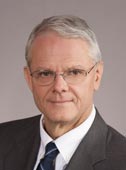Targeting Health Care Costs:
PROPOSED CUTS RUN DEEP IN SOME SURGICAL SPECIALTIES

James Rutka
|
As many of you know, the Ontario
Medical Association (OMA) has
been having difficulty this year
reaching a negotiation for a new
agreement with the government
for the funding and delivery of
medical services. The government
faces significant fiscal challenges with the funding of health
care. Cuts in the order of $1 billion for medical programs
and services are being proposed over three years. These cuts
may jeopardize gains we have come to appreciate and realize
in reducing wait times for surgeries and obtaining important
diagnostic tests in a timely manner.
I have had an opportunity to review some of the proposed
cuts to the health care budget that affect surgical
specialties in the province announced on May 7th, 2012.
Across our Divisions and programs, the cuts vary from
a low of -0.3% in the case of Plastic Surgery, to a high
of -9.9% in Vascular Surgery. The specialties which may
be affected the most by these cuts are Vascular Surgery,
Neurosurgery (-5.3%) and General Surgery (-3.5%).
For Vascular Surgery, the government has identified
vascular ultrasound tests performed by vascular surgeons
as an area of cutback; for Neurosurgery, it is the use of
stereotaxis for craniotomy for tumour or vascular cases;
and for General Surgery, colonoscopy and gastroscopy
procedures are being targeted.
While at first glance some of these cutbacks do not seem
aggressive or deleterious, for some surgeons whose practices
rely heavily on earnings received from procedures
that are being targeted, the situation is different. Lest
you feel that surgeons are the only ones being affected
by the Government’s actions, other specialties stand to
be affected more. For example, the cuts initially proposed
to Cardiology are the highest of all in the Province
amounting to -13.8% for 2012-13. The Government has also identified Anaesthesia (-5.7%), Internal and
Occupational Medicine (-5.6%), Ophthalmology
(-11.4%), and Diagnostic Radiology (-6.4%) as in need
of some targeted adjustments. In total, with these cutback
measures that affect professional and technical fees,
the Government hopes to trim some $340 million from
its Health Care expenditures for 2012.
|
Interestingly, on July 4th, 2012, the government
announced it would halt plans to halve the fees paid
to doctors for certain diagnostic tests after cardiologists
and others warned that the cut could hurt patients’ care.
The 50% reduction in payments related to self-referral
testing where cardiologists use their own equipment to
perform exams such as echocardiograms and X-rays.
In the second week of July 2012, the OMA officially
filed a Charter challenge against the government in
the Ontario Supreme Court. The Court is being asked
to reverse the unilateral fee cuts, to order the government
back to the negotiations table, and to confirm the
OMA’s representational rights on behalf of doctors in
the province.
I do not think any of us would argue with the need
to contain healthcare costs in the province which are
currently estimated at almost 50% of the entire provincial
budget, with annual expenditures of $46 billion.
However, when the above cuts are implemented at precisely
the same time that the Government is introducing
Health Borders Allocation Methodology (HBAM) into
Hospitals and moving away from global budget funding,
the effects on surgical services at hospitals may be
affected even more, creating a perfect storm.
I also think we agree that as surgeons we have done
extremely well and have enjoyed an excellent quality of
life with procedural tariff increases that have accrued to
us these past several years. My advice is that we continue
to work through and support the OMA in its negotiations
with the Ministry of Health. We should charge our
specialty specific OMA representatives to be at the tables
through the negotiation processes so that our voices are
heard. The best outcome, in my opinion, would be if
the government and the OMA could come back to the
table again to negotiate in good faith, and to rationally
and equitably suggest cuts that will accomplish what the
government has stated is necessary. I will be discussing
these and other matters with the Department Chairs in
Surgery across the province. I will keep you informed of
any further developments as the dialogue continues.
James T Rutka,
RS McLaughlin Professor and Chair
|